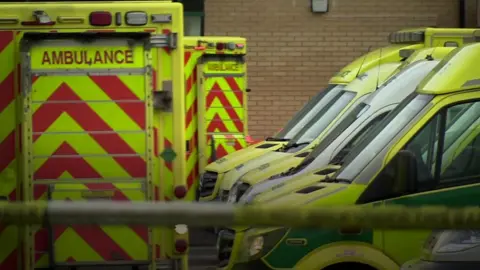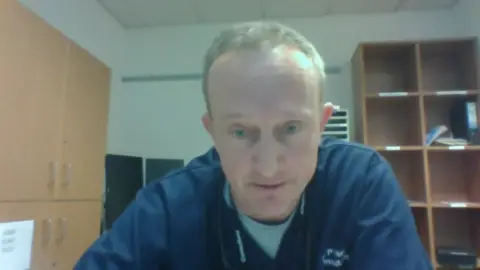Ulster Hospital: Eight-hour ambulance wait 'unacceptable'
 BBC
BBCAn eight-hour wait in an ambulance by an elderly woman who died in the Ulster Hospital has been described as as "sad and unacceptable", by the Royal College of Emergency Medicine in NI.
A review of the incident is under way at the South Eastern Health Trust.
BBC News NI understands the woman died from a heart attack and her death is not being linked to the ambulance wait.
Dr Paul Kerr, the college's vice president, said long waits inevitably increase a patient's risk.
But he said at all times staff are doing their best to "protect patients and respect their dignity".
The health trust confirmed the woman died in the emergency department (ED) despite attempts to resuscitate her and that it followed the eight-hour wait.
According to a health trust statement, at all times both while in the ambulance and in the emergency department at the Ulster Hospital the woman had received "one-to-one care".

Dr Kerr said he was unable to comment on that particular case, but that they had seen increasing numbers in Emergency Departments across Northern Ireland.
"I thought this was dreadful and very sad, because, as you know, we have been seeing increasing numbers of very long waits, some of them in ambulances outside emergency departments all across Northern Ireland in the last few months," he said.
He added: "It is always extremely difficult when you are working in a very crowded department, with people waiting outside in ambulances who you know desperately need your help."
Dr Kerr said the Royal College had "been emphasising the increased risk of situations like this in all our hospitals and we have increasing evidence that there is increased risk of death in cases like this associated with waits over eight hours and that is an association, not a direct causation".
He added: "Sometimes these patients are in an end of life situation and staff are unable to tend to them appropriately and there is a loss of dignity - we don't want that to happen."
'More hospital beds needed'
Meanwhile, the deputy chair of the Northern Ireland General Practice Council has said a patient's final hours should be as peaceful as possible.
Dr Frances O'Hagan said it is important that where possible, families can be there, and that a patient's "last journey can be made as comfortable as possible".
She said the system needs more hospital beds especially as the number of people being admitted with Covid is rising.
Dr O'Hagan said that means hospital beds are full, which is preventing other non-Covid patients from being admitted.
"EDs are not wards, EDs are full of patients, some in corridors, and staff do not want to be looking after patients in these circumstances," she said.
According to Dr O'Hagan, those working on the front line in the community or in hospitals know the system needs to be changed.
"I would like people to consider when they are casting their vote at the election: 'Do you want to cast your vote for someone who is going to give you more of the same and more [of] a broken system or are you going to cast your vote for people who are going to be brave and change the system and make it better?'"
Dr Paul Kerr also said change is the key and it is not enough to quote report after report being available, but instead what is required is action.
He said the correct management and leadership was needed "to make sure things gradually stop getting worse".
"We need to stabilise things; we need to see a little bit of improvement because at the moment things have been getting dramatically worse."
